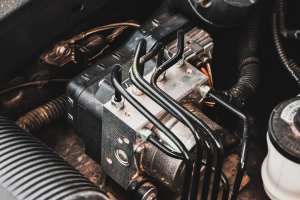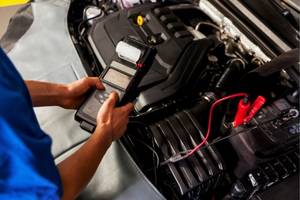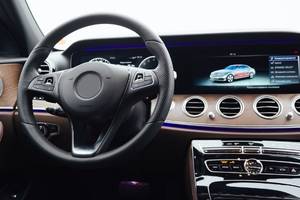Introduction
Are you a proud Honda owner? Ever heard of an ECU but not quite sure what roles it performs or why it's important? Well, you're in for a treat. Today, we're going to simplify the world of Honda ECU, a little-known but essential component of your beloved vehicle. The Engine Control Unit (ECU) is the brain that keeps your Honda running smoothly, effectively, and at its best. Without a fully functional ECU, your Honda might not perform to its full potential. So, buckle up as we dive right into the necessary roles of the ECU, common problems you might face, and the best practices for maintaining it. Ready to learn how to keep your Honda in top shape? Let's get started!
1. Honda ECU: An Overview
The Engine Control Unit, or ECU for short, is the brain of your Honda. It's the digital marvel that keeps your engine running smoothly, optimally, and efficiently. Simply put, without a fully functional ECU, your Honda just isnt living up to its full potential and is just metal.
So, what does an ECU do? Quite a lot, actually.
Fuel Injection: The ECU manages the amount of fuel injected into the engine. This ensures the best possible mix of fuel and air for combustion, leading to optimal performance and fuel efficiency.
Ignition Timing: The ECU determines the exact moment to ignite the fuel in the engine. This is crucial for smooth running and power delivery.
Idle Speed Control: Ever wondered how your Honda maintains a steady idle even when the engine is cold? That's the ECU doing its magic—maintaining the perfect idle speed under different conditions.
If you're starting to get the picture, you'll realise that a well-functioning ECU is vital for your Honda. It's not just about performance—it's about efficiency, smooth operation, and even increasing the lifespan of your vehicle. And that's where Honda ECU repair service comes into play. Because, like any other part of your Honda, the ECU can sometimes need a little TLC. But don't worry, we'll get to that in the next section. For now, just remember: taking care of your ECU is taking care of your Honda. And who doesn't want a happy, healthy Honda?
2. Common Honda ECU Problems and Solutions
Let's face it, even the most reliable devices have their off days, and the ECU is no exception. It might be a digital marvel, but it's not unbeatable. So, what are some of the common issues that might send you searching for a Honda ECU repair service?
Trouble Starting Your Honda
Does your car hesitate or struggle when you want it to start? Is it acting like it's Monday morning and it just can't get out of bed? This could be a sign that your ECU is having a problem.
Solution: A Honda ECU repair service can perform a diagnostic check to figure out if the ECU is causing the trouble. If it is, they can repair or replace it, so your Honda can start jumping out of bed like it's Friday afternoon.
Check Engine Light Staying On
We've all been there—the dreaded check engine light comes on and won't go off, no matter how many times you hit the dashboard (not recommended, by the way). If the ECU is the culprit, the light could stay on even when there's nothing wrong with the engine.
Solution: Running a diagnostic check is the first step. If the ECU is the problem, Honda ECU repair services can fix it up, making that annoying engine light a thing of the past.
Poor Fuel Efficiency
If your Honda is guzzling gas like there's no tomorrow, or you are having to make more visits to the gas station than usual it might be a sign your ECU is not managing fuel injection properly.
Solution: A Honda ECU repair service can recalibrate or repair the ECU, ensuring it's managing fuel injection efficiently and your Honda stops drinking fuel like it's going out of fashion.
Remember, these are just common issues. There can be other, less obvious symptoms that your ECU needs a check-up. So, if your Honda is acting strange, it might be time to consult a Honda ECU repair service. After all, a healthy Honda is a happy Honda, right?
3. Tips for Honda ECU Repair
Now that you're aware of some common ECU issues. But what happens when you need to roll up your sleeves and get to work? Here are some tips for those brave souls ready to tackle Honda ECU repair themselves.
Understand the Problem
Don't dive in headfirst without knowing what you're dealing with. It's important to understand the problem before going for a repair. This is where a good diagnostic tool comes in handy. It can help you detect the issue and save you from the guesswork.
Remember, your tools are your best friends in this repair journey. Make sure you've got the right ones. You'll need a diagnostic scanner, a soldering iron, a multimeter, and a Honda ECU repair manual. Using the correct tools can make the difference between a successful repair and a frustrating, fruitless effort.
Seek Professional Help if Needed
Let's be frank, not everyone is a born mechanic. If you're not comfortable with DIY repairs, it's best to leave it and call the professionals. The specialised knowledge and experience of a Honda ECU repair service can save you time, money, and potential damage to your car.
Safety First
Working with electronic components can be risky. Always ensure your safety before starting any repair work. Disconnect the battery, if you don't like electric surprises, wear safety glasses and gloves, and work in a well-ventilated area.
Remember, Handling Honda ECU repair can be a rewarding experience, giving you a sense of accomplishment and possibly saving you some cash. But it's okay if you'd rather leave it to the pros. After all, we can't all be DIY wizards, right?
4. Best Practices for Maintaining Your Honda ECU
So, you've got your Honda ECU running smoothly again. But how do you keep it that way? Here are a few best practices to ensure your ECU stays in great shape.
Regular Checkups
Just like a human body, our cars need care and attention too. Don't wait for a problem to arise before you give your ECU some attention. Regular diagnostics can help identify potential issues before they become major headaches.
Keep it Clean
Dirt and debris can cause havoc on your ECU. Make a habit of cleaning the ECU and its connectors regularly. A can of compressed air can be your best ally in keeping those hard-to-reach areas dust-free.
Protect the ECU from Extreme Conditions
Extreme temperatures and moisture can damage the ECU. Try to park your Honda in the shade on hot days and in a garage during severe weather. These practices can increase the lifespan of your ECU.
Update Software Regularly
Software updates can improve the performance of your ECU. Just like you keep your mobile phone software up-to-date, it's important to regularly update your ECU software.
When in Doubt, Consult a Professional
If you notice any strange behaviour in your vehicle, don't hesitate to consult a professional. A Honda ECU repair service has the expertise to diagnose and fix problems quickly and efficiently.
Remember, maintaining your Honda ECU isn't just about dealing with problems as they arise. It's about taking proactive steps to prevent those problems in the first place. Because, as we all know, prevention is better than cure!
Conclusion
In summary, the Honda ECU is an essential part of your vehicle's performance and efficiency. From managing fuel injection to controlling ignition timing and idle speed, the ECU makes sure that your Honda runs smoothly and ideally. While ECU issues can affect your car's performance, knowing the common problems and their solutions can help you address them quickly. Remember to follow best practices for maintaining your ECU to avoid future issues. Whether you're a DIY enthusiast or prefer professional help, keeping your ECU in excellent condition will make sure that your Honda remains a reliable and enjoyable vehicle. Here's to a happy, healthy Honda!
FAQs on
Comprehensive Guide to Honda ECU Repair Service in 2025 : Tips and Best Practices
-
1. What is an ECU in a Honda, and why is it important?
Ans.
The Engine Control Unit (ECU) is the central computer that manages several engine functions in your Honda. It controls fuel injection, ignition timing, and idle speed, making sure of ideal engine performance and efficiency. A well-functioning ECU is necessary for smooth operation and fuel efficiency.
-
2. How do I know if my Honda ECU is malfunctioning?
Ans.
Common signs of a malfunctioning ECU include trouble starting your vehicle, a constant check engine light, and poor fuel efficiency. If you notice these issues, it's advisable to get a diagnostic check to determine if the ECU is the cause.
-
3. Can I repair my Honda ECU myself, or should I seek professional help?
Ans.
While some DIY enthusiasts may handle ECU repairs themselves, it’s often best to consult a professional. ECU repairs can be complicated, and a professional repair service will have the specialized knowledge and tools to handle the issue effectively.
-
4. What are the common problems with Honda ECUs and their solutions?
Ans.
Common problems include difficulty starting the vehicle, a constant check engine light, and decreased fuel efficiency. Solutions involve diagnostic checks to identify the issue, followed by repairs or replacements as needed to restore proper ECU function.
-
5. How can I maintain my Honda ECU to prevent issues?
Ans.
Regular checkups, keeping the ECU clean, protecting it from extreme temperatures and moisture, updating software, and consulting professionals when needed are key practices to maintain your ECU. These steps can help increase the life of your ECU and prevent possible problems.
-
6. What should I do if my Honda’s check engine light stays on?
Ans.
If the check engine light stays on, it could indicate an ECU issue or another problem. Perform a diagnostic check to pinpoint the cause. If the ECU is found to be the issue, professional repair services can address it to make sure the light goes off and your vehicle runs smoothly.


